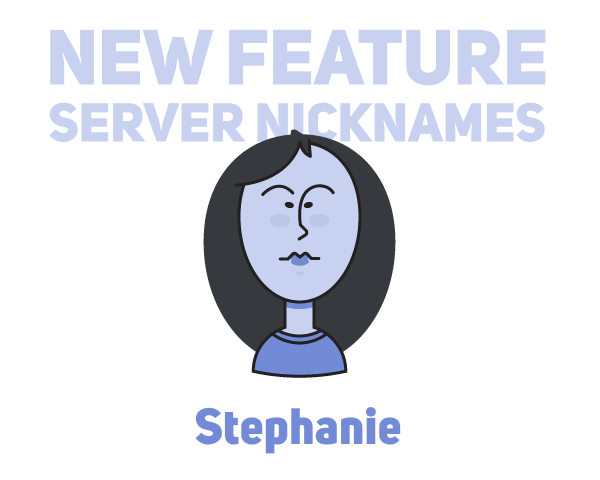Discord: The new digital third space
Originally published on Medium
“Slack? Never heard of it.” My sister is just a few years younger.
“Everyone is on Discord now.”
 From r/discordapp (u/Knight0wl)
From r/discordapp (u/Knight0wl)
I have had a long five-year love affair with Slack: I have the deepest respect for the company, am unapologetically impressed by their new brand refresh, and have used the platform for everything from participating in and planning hackathons, running student organizations, and cultivating community.

I was flummoxed when I first heard of Discord (“isn’t this just glorified IRC for gaming?”), but I couldn’t help but grow more curious about a gaming origin story arguably more compelling than Slack’s and truer to its gaming roots.
In a world of 2.3BN+ active gamers spending $137.9BN in digital games revenue,¹ Discord’s ability to provide the connective tissue between these gamers—and increasingly, non-gamers—both on and off-line will translate into one of the most consequential product plays for the social ecology of the internet.
What is Discord and why do people use it?
Discord is an all-in-one voice, text, and video chat application that brings gamers together.
14MM daily players send 315MM messages a day with Discord.² Underneath these numbers is a fundamental human love and obsession with playing games: Games mean a lot to people, and Discord makes it easier for people to spend time with others playing games and participating in the communities that spring out of games.
On Discord, users join themed servers populated with topic-specific text and voice channels to chat about everything from gaming to other interests such as entrepreneurship or spirituality and, of course, criminally dank memes.
How does Discord make money? Discord disavows ads or selling user data. Rather, the company has introduced two subscription plans: Nitro, a $9.99/month plan for access to a library of critically acclaimed games, which includes the $4.99/month Nitro Classic subscription’s enhancements to the chat experience with features such as higher upload limits or custom animated emoji.
As for future monetization plans, who’s to say Discord can’t introduce referral revenue sharing, enhanced moderation capabilities for large or curated communities, or Nitro-bundled virtual reality content?
A tale of two glorified IRCs
Both Discord and Slack share roots in gaming (see Slack’s redemptive pivot from failing game development shop to $7.1BN collaboration software company).³ Both are each synonymous with an entire industry (gaming chat and team collaboration), yet there exists a growing generational gap between the two platforms worth taking note of.
Paralleling markedly different Gen Z attitudes and product usage of Facebook and Instagram, younger users (those who have never heard a dial-up tone or used a VHS tape) are quickly adopting and spinning up inventive use cases for Discord.
What does Discord have going for it?
Digital third spaces
Though both Discord and Slack exist to bring people together online, users see a world of a difference between both platforms.
“Slack comes off more like a conference call or a corporate chat room,” says a Discord user, comparing Discord to a “real-time Reddit” in contrast to Slack’s enterprise leanings.⁴
Consider the techlash against established social media platforms: When 44% of Facebook users ages 18 to 29 have elected to delete Facebook from their phones,⁵ where are they going? In a rebuke of crowded, oversharing news feeds and platforms rife with digital abuse, younger users are seeking tighter-knit, pseudonymous digital third spaces.
Discord’s commitment to safety and privacy, as well as users’ ability to create or join a Mandelbrot fractal’s worth of servers and channels within servers, has enshrined the platform as the new digital third space for 14MM daily active users.
A commitment to online safety and the future of identity
Anil Dash calls out the danger of real name policies on online communities, noting that such policies are difficult to productively enforce and endanger vulnerable people.⁶
In contrast to a real name policy such as that of Facebook, Discord adopts a Shakespearean permissiveness (“What’s in a name?”) of identity in online names. Like Romeo and Juliet at the masquerade ball, Discord users can adopt different nicknames for different servers and minimize the risk of letting on any identity information they don’t wish to reveal.
One caveat to unique server names: There still exists a risk of leaking identity information, as users choose a server nickname only after joining a server. Discord can address this potential vulnerability via allowing users to set a default per server unique nicknames policy, enforcing the choosing of a nickname before joining any server.
 From Discord Support: Server Nicknames
From Discord Support: Server Nicknames
Security-conscious features such as two-factor authentication, optional phone number verification, direct message permissions, and automatic moderation contribute to a safe Discord experience.
A single sign-on experience wraps all of a user’s different identities across different servers under one point of login, in contrast to Slack’s requirement of unique logins for each Slack workspace.
While these features may seem essential and taken-for-granted, Slack only launched two-factor authentication at the same time as announcing its 2015 security breach.⁷
Discord’s safety culture doesn’t just exist in a vacuum of product features: Consider the legendary, albeit anecdotal response times of its Customer Experience support staff, available in-app and on Twitter, in response to escalating situations on servers.
Flexibility across communities small and large
Let’s consider why Slack scales poorly for large communities: user invite limits, file upload limitations on free workspaces, and per-user pricing (Slack is stingy with even education pricing) are all prohibitive for large online communities.
In contrast, Discord boasts servers with tens of thousands of users (the PUBG Mobile server has 250,000+ users alone).⁸ File upload limits are set on individual users, and can be increased by purchasing a subscription plan. Likewise, the pricing burden is on individual users to purchase a Nitro subscription plan, rather than on Slack workspace owners to pay per user (as would come with the territory of an enterprise business model).
Admins of public Slack communities have had to hack around solutions for openly inviting users (oftentimes via a handy automatic sign-up Heroku app). To Slack’s credit, Slack has introduced features to make inviting users easier, albeit within an enterprise context filtered by shared email address domain. Discord, on the other hand, has provided sharable server join links from the beginning.
Community moderation doesn’t scale on a platform such a Slack, whereas Discord’s offering of Verified Servers for brands, public figures, and large communities provides moderator roles, verification levels, channel permissions, and content filters.⁹
 Discord Support: Verified Server Moderation Guidelines
Discord Support: Verified Server Moderation Guidelines
Unexpected use cases beyond gaming
Beyond gaming, Discord’s ease of bringing people together has proved useful for many other use cases both adjacent and far from gaming.
To consider my younger sister and her peers, for instance, they would login to different Discord servers for their various classes and extracurricular clubs.
Where they now use Discord, my peers and I—only some years older—had instead used Facebook groups or Slack workplaces to organize our academic and extracurricular communities online.
Many gaming communities or fandoms that would have existed as Facebook groups in the past are now on Discord. Now with many of us choosing to leave closed ecosystems such as Facebook, Discord offers an easier, more open alternative to curate our various online groups.
What do I wish were better about Discord?
Better native server discovery
Consider the number of third-party sites that show up when you Google search for Discord servers to join.
These unofficial sites suggest an unmet need where Discord can strengthen user onboarding by better facilitating server discovery.
There is a rich catalog of Discord servers dedicated to everything desktop or mobile gaming, as well as gaming-adjacent and non-gaming communities and fandoms of all sorts.
Direct game integration
Gamers wish to minimize any distractions that will take them away from the gaming experience. For the same reasons why competitive gamers care about internet bandwidth and why esports-fluent Korea boasts the fastest Internet speeds in the world, gamers want and will pay for the most seamless experience as possible.
How might Discord abstract away its own presence as an external chat application and directly integrate as seamlessly into the native gaming experience? Discord Gamebridge, an SDK for developers that never made it out of closed beta, may have been the closest product to realizing an integrated experience.
Discord’s product plays catering to online safety and privacy, convenient and pseudonymous identity, and large online third spaces make it the perfect product to receive an exodus of users in search of different forms of connection than those offered by social media platforms such as Facebook.
Discord shows us a shifting online ecology borne by a more privacy-aware public and evolving norms of online social organization. What is today a metonym for the gamer’s third space can very well transform into a new threshold of discovery and connection for classrooms, workplaces, and all other sorts of communities.
This article was written as part of my application to the 2019 Kleiner Perkins Product Fellows Program. Excelsior!
[1] Newzoo 2018 Global Games Market Report
[2] Discord Company
[3] Crunchbase: Unpacking The Latest Slack Usage Figures As The IPO Market Restarts
[4] Discord vs Slack — Gaming, Working or Both?
[5] Pew Research Center: Americans are changing their relationship with Facebook
[6] The Immortal Myths About Online Abuse
[7] Slack: March 2015 security incident and the launch of Two Factor Authentication